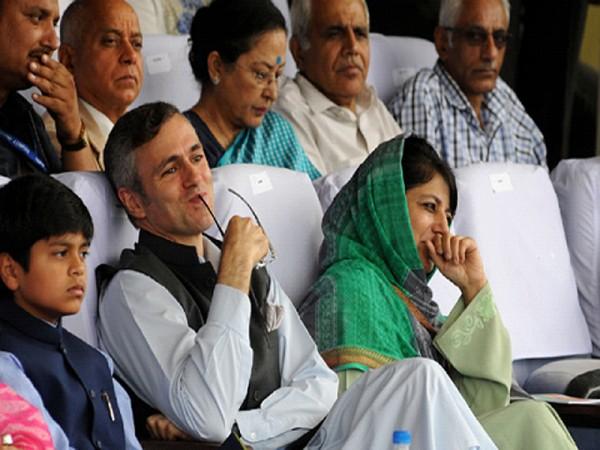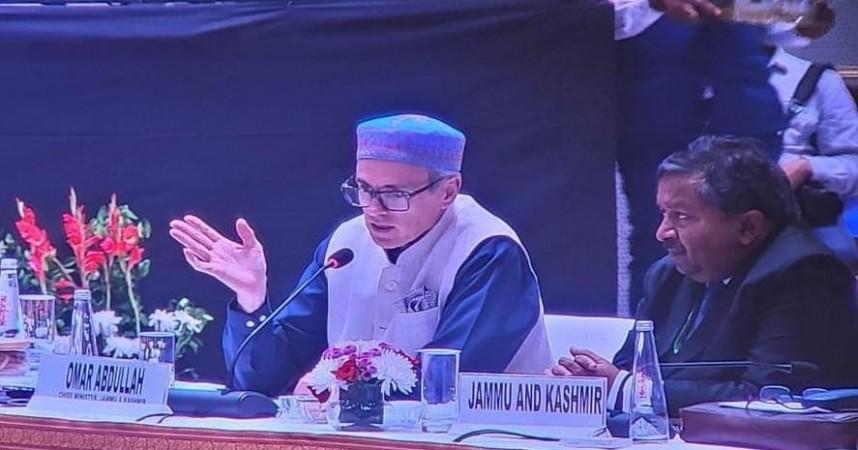
Peoples' Democratic Party (PDP) chief Mehbooba Mufti on Wednesday accused Jammu and Kashmir Chief Minister Omar Abdullah of toeing BJP's line by touching the "settled issues" with Pakistan.
Omar Abdullah's arch-rival Mehbooba Mufti passed these remarks while reacting to the Chief Minister's statement at New Delhi on Tuesday where he highlighted constraints imposed on Jammu and Kashmir on harnessing its hydropower potentials due to the Indus Water Treaty with Pakistan.
Mehbooba Mufti argued that initiating a debate on "settled issues" with Pakistan, such as the treaty, would only serve to align with the BJP's interests.
According to Mehbooba, by revisiting the Indus Water Treaty—a longstanding agreement between India and Pakistan—the conversation risks being co-opted by the BJP for political gains on a national level.
Although successive governments in Jammu and Kashmir, including the PDP-Congress coalition that governed from 2002 to 2008, have previously raised concerns about the hardships the Treaty imposes on the region, Mehbooba believes the timing and intent behind discussing the Treaty are crucial.
She warned that amplifying this issue now could lead to further exploitation by the BJP, which could frame the treaty in a way that serves their electoral strategy and nationalist agenda across India.
Mehbooba's caution against revisiting the Treaty stems from her apprehension that such moves might exacerbate tensions between India and Pakistan. She argued that reopening established agreements like the Indus Water Treaty could unsettle the delicate regional stability, which has been hard-won over the years.
![Complete J&K's hydropower projects; Indus Water Treaty task force reviews progress [details] Complete J&K's hydropower projects; Indus Water Treaty task force reviews progress [details]](https://data1.ibtimes.co.in/en/full/785497/complete-jks-hydropower-projects-indus-water-treaty-task-force-reviews-progress-details.jpg?w=659&h=449&l=50&t=40)
India-Pakistan signed the Indus Water Treaty in 1960
The Indus Water Treaty brokered in 1960 between India and Pakistan with the assistance of the World Bank, remains a key instrument in the sharing and management of the rivers that flow through both nations, particularly impacting Jammu and Kashmir.
Despite ongoing conflicts and military tensions, the Treaty has withstood the test of time, allowing for continued cross-border cooperation and data sharing on water resources. While it has played a stabilizing role, it has also been a point of contention, particularly in Jammu and Kashmir, where local leaders argue that it limits the region's autonomy over its own natural resources.
Mehbooba highlighted the severe impact that Indo-Pakistani tensions have historically had on Jammu and Kashmir, pointing to a legacy of suffering, loss of life, and extensive property damage over the last 75 years.
In her view, while the Indus Water Treaty has its limitations, rekindling the debate could backfire on Jammu and Kashmir by intensifying divisions and creating a new platform for the BJP to advance its nationalistic rhetoric. She expressed her belief that leveraging this issue would ultimately favor the BJP's interests rather than addressing the longstanding needs of the region.

Mehbooba criticizes Abdullahs for handing over power projects to the Centre
Furthermore, Mehbooba openly criticized the Abdullah family, alleging that their decisions had undermined Jammu and Kashmir's self-sufficiency in the energy sector.
She pointed specifically to the decision to transfer several of the region's key hydropower projects to the National Hydroelectric Power Corporation (NHPC), a move that she claims has disadvantaged Jammu and Kashmir by diverting crucial local resources to the central government.
She recalled that the founder of the National Conference and grandfather of Omar Abdullah Sheikh Mohammad Abdullah handed over the Salal Hydro-electric project to the NHPC. She further said that Dr. Farooq Abdullah during his tenure as Chief Minister in 1996 handed over seven hydroelectric projects to the NHPC.
Mehbooba demanded the return of at least two major power projects or financial compensation from the central government, contending that this would allow the region to better harness its natural resources and strengthen its economy.
Rather than advocating for the abolition of the Indus Water Treaty, Mehbooba instead urged the central government to honor the terms laid out in the PDP-BJP alliance agenda, which had once included a commitment to return several power projects to Jammu and Kashmir. She emphasized that fulfilling these promises would not only align with the alliance's past agreements but would also provide much-needed economic relief and development opportunities for the region.

Treaty creating hurdles in J&K's potential hydel power generation: Omar
On Tuesday Chief Minister Omar Abdullah has underscored the need for addressing the constraints imposed by the Indus Water Treaty (IWT) on Jammu and Kashmir's ability to harness its vast hydropower resources.
Omar highlighted the limiting clauses in the Indus Water Treaty that restrict Jammu and Kashmir from realizing its full hydel potential by only permitting run-of-the-river projects.
"Hydel power is J&K's only viable energy source. The region is compelled to rely on power imports from other States, which adversely impacts its economy", he said.
"To address this, J&K would require special compensation from the Government of India, including viability gap funding and equity assistance, to harness its untapped hydro-energy potential," he said, adding the support would not only help in meeting the region's energy needs but also contribute to national clean energy goals.
He explained that the Treaty, which governs the use of river waters between India and Pakistan, limits Jammu and Kashmir to run-of-the-river projects and restricts its capacity for water storage. This limitation, he noted, severely hampers power generation, especially in the winter months, resulting in energy shortfalls and hardships for residents.
The Chief Minister, who also manages the Power portfolio, made these remarks at the Conference of Power Ministers of States and Union Territories held today in Delhi, which was chaired by Union Minister for Power, Manohar Lal.

















